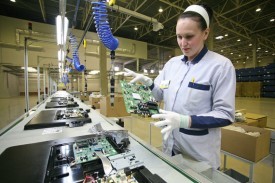The benefits of devaluation? Russian companies carry electronics assembly from Asia to Russia
 Many may have noticed that recently the ruble exchange rate against the dollar has slightly changed in the direction of the collapse. Devaluing one's own currency is one of the most effective measures to stimulate the economy during a recession. Import decreases, which stimulates domestic producers. Salaries of the population are reduced (in dollar terms), this reduces the cost of domestic products and makes them more competitive.
Many may have noticed that recently the ruble exchange rate against the dollar has slightly changed in the direction of the collapse. Devaluing one's own currency is one of the most effective measures to stimulate the economy during a recession. Import decreases, which stimulates domestic producers. Salaries of the population are reduced (in dollar terms), this reduces the cost of domestic products and makes them more competitive.Benefit from the devaluation of the ruble learned Russian electronics manufacturers, write "Vedomosti".
For example, the company "Datakam" (manufactures car DVRs, radios, etc.) moved part of the assembly production from Taiwan to Moscow. Due to savings on import customs duties, reduction of logistics costs and lower wages of workers in general, the cost of data collectors collected in Russia for Datacam is 20% lower than in Taiwan, said company owner Vladislav Mekhantsev. He added that labor costs per employee are three times lower here than in Taiwan.
The flexibility of the range and the release of goods in small batches is another advantage of the local assembly. Localization of production allowed to expand the range of devices and develop new models of radios. Less than a year after the assembly was moved to Russia, the level of marriage decreased from 3 to 0.5%, and the productivity of Russian assemblers was 2.5 times higher, the company owner said. Printed circuit boards for Datacam radios are now made in Yekaterinburg, polymer batteries - in Lipetsk.
')
Another manufacturer who benefited from the devaluation is Vocord, the developer of video surveillance and face recognition systems, Vedomosti writes. The company's general director, Timur Vekilov, says that the quality of the products of Russian assemblers is not inferior to foreign analogues, but much cheaper: “Of course, there are components that are not produced in Russia, and we have to order them abroad. But their share in the cost of our products has always been insignificant and, apparently, will decline. ” He says that before, the costs of manufacturing equipment in Russia and abroad were about the same, but now it is often cheaper to collect in Russia.
A couple of years ago, the assembly of electronics in China was much cheaper for the GS Group company (owns electronics manufacturing enterprises in the Kaliningrad region) than in Russia. But due to the fall of the ruble, the preparation of molds and related processes for assembling electronics in Asia has risen in price for Russian B-brands almost twice. Therefore, the placement of assembly plants in Russia has become much more attractive for them.
Alexander Kalinin, President of the Aquarius Group of Companies, believes that due to the devaluation, the income of Russian collectors will increase to 15%.
GS Nanotech (as part of Technopolis GS) started with the assembly of RAM chips, and now has developed and manufactures its own SiP Amber S2 processor. Kraftway manufactures proprietary motherboards, tablets, servers, communications equipment and other equipment on its motherboards at the Obninsk plant.
It turns out, thanks to the crisis in Russia, they finally began to produce modern electronics.
Source: https://habr.com/ru/post/391185/
All Articles